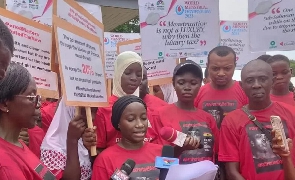The Ghana CSO Platform on SDGs, representing 112 civil society organizations, has submitted a formal petition to key government officials, including the Speaker of Parliament, the Minister of Finance, the Minister of Gender, Children, and Social Protection, and the Minister of Health, calling for the removal of taxes on sanitary pads.
The CSOs argue that the current tax regime places an unfair burden on women and perpetuates gender discrimination.
“Stop sacrificing a girl’s esteem at the altar of menstrual myths.
“Presently, the government of Ghana, under the harmonized system code 9619, classifies sanitary pads as a miscellaneous manufactured article that attracts a myriad of taxes, including 20% import duty, 13% import VAT, NHL 2.5%, and other levies, as well as service charges.
“This means that under the current tax regime, taxes are imposed on the biological necessity, especially for low-income households. Currently, prices of a pack of sanitary pads range between GH¢15 to GH¢30, and an average of two to three pads are needed to manage one’s flow in a month…” the lead convener, Latifa Abdul-Hadi, said.
According to the group, these additional costs make sanitary pads unaffordable for many poor households, further disadvantaging women who constitute approximately 60% of the population.
The CSOs highlighted that the high cost of sanitary pads exacerbates the challenges faced by women and girls, including stigma, discrimination, and period poverty.
They argue that accessibility, affordability, and availability of menstrual hygiene products are crucial to ensuring the well-being and dignity of women and girls.
In their petition, the group asserts that any policy that discriminates against a specific segment of the population and exacerbates their poverty goes against the principles of inclusivity and democracy. They contend that taxing sanitary pads directly targeted at females is discriminatory, unjust, and immoral.
“We, the unlisted civil society organizations, take it that the policy discriminates against a section of its population and pushes them into further poverty and has no place in an inclusive democratic environment. Therefore, the impositions of sanitary pads are directly targeted at females, making the tax highly discriminatory, unjust, and immoral… We call on the government and all agencies involved to expedite the scrapping of the taxes on the pad,” she added.
Meanwhile, watch a snippet of GhanaWeb TV's latest program that focuses mainly on Everyday People below:
You can also watch the latest episode of People & Places on GhanaWeb TV:
Meanwhile, watch the latest episode of SayItLoud on GhanaWeb TV below:
Watch the latest edition of BizTech and Biz Headlines below:

AM/GA
General News of Thursday, 1 June 2023
Source: www.ghanaweb.com

















